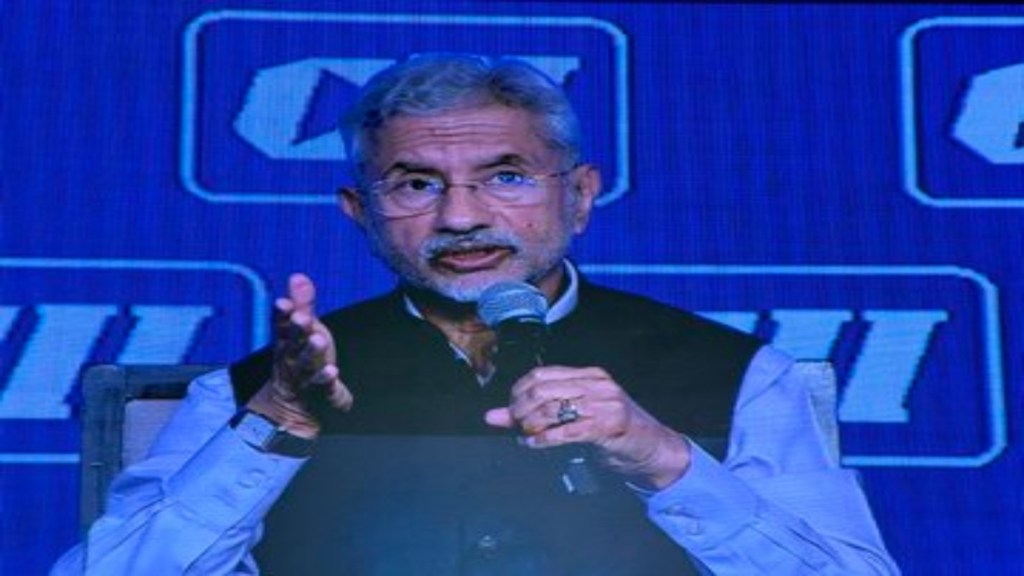Amid escalating tensions in Asia, External Affairs Minister S Jaishankar addressed the challenges posed by China’s military assertiveness and global diplomatic manoeuvres. He underscored the repercussions of dishonoured agreements and the erosion of the rule of law, emphasizing the interconnectedness of land and sea disputes.
Highlighting the power dynamics of global diplomacy, Jaishankar discussed the implications of currency manipulation and the use of sanctions as diplomatic tools, particularly in light of recent developments regarding the Chabahar port deal. In an address at the CII Annual Business Meet, the minister also made a veiled reference to Pakistan, and noted the growing threat of terrorism and extremism, and their destabilizing effects on the region.
Moreover, he delved into the broader geopolitical landscape, examining the ramifications of the Ukraine conflict, escalating violence in West Asia, and disruptions in logistics due to geopolitical tensions, sanctions, drone attacks, and climate events. He characterized the current situation as a “perfect storm,” emphasizing India’s role in mitigating its impact and fostering global stability.
“The world is experiencing a 3F crisis of fuel, food and fertilisers. In Asia, new tensions have emerged in land and sea as agreements are dishonoured and rule of law disregarded,” he said at the annual general meeting of the industry body.
“Terrorism and extremism have started to consume those who have long practised it. In many ways, we are actually going through the perfect storm,” he said.
“For India, the task is to mitigate its impact on itself and contribute to stabilising the world to the extent possible. It is this judicious combination of ‘Bharat First’ and ‘Vasudhaiva Kutumbakam’ that defines our image as ‘Vishwa Bandhu’,” he said.
Focus on Latin America, Africa and West Asia
Expanding on India’s economic outlook, Jaishankar emphasized the need to diversify global resource access, particularly with emerging opportunities in Russia and Latin America.
“An economy with India’s prospects also has to look at accessing global resources more seriously if we are to fuel our growth. For long, India has looked at Russia from a political or security perspective. As that country turns eastwards, fresh economic opportunities are presenting themselves. The spike in our trade and the new areas of cooperation should not be regarded as a temporary phenomenon.”
The minister highlighted interest of India to expand numbers and volume with Latin America, Australia in addition to established ones like Indonesia, Africa and West Asia.
Focus on Connectivity
He highlighted India’s efforts to enhance connectivity, including projects like the India-Middle East-Europe Economic Corridor (IMEC) and the India-Myanmar-Thailand Trilateral Highway, underscoring their significance in shaping India’s future and influencing global dynamics.
To the East, the minister said that the resumption of work on the India-Myanmar-Thailand Trilateral Highway will provide India access all the way to the Pacific. “We are even examining the viability of polar routes, initially with the Chennai-Vladivostok corridor,” he added.
The India-Myanmar-Thailand Trilateral Highway stands as a testament to India’s commitment to enhancing regional connectivity. This ambitious project aims to establish a seamless road link between India, Myanmar, and Thailand, unlocking new avenues for trade, investment, and people-to-people exchanges. By facilitating smoother movement of goods and people, the highway not only fosters economic integration but also strengthens diplomatic ties among the participating nations.
In addition to physical connectivity, India has also made significant strides in enhancing digital connectivity. The proliferation of digital technologies has revolutionized communication, commerce, and governance, bringing about a paradigm shift in how societies interact and operate. With initiatives like Digital India and BharatNet, India is bridging the digital divide and empowering millions with access to information, services, and opportunities.
Moreover, India’s focus on innovation and entrepreneurship has fuelled the growth of vibrant startup ecosystems, further amplifying the country’s connectivity with the global economy. By nurturing a conducive environment for innovation and providing support to budding entrepreneurs, India is not only fostering domestic growth but also strengthening its linkages with the global innovation landscape.
However, amidst these advancements, challenges remain. The COVID-19 pandemic exposed vulnerabilities in global supply chains, highlighting the need for greater resilience and diversification. As Jaishankar pointed out, the pandemic-induced disruptions underscored the importance of building resilient and reliable supply chains that can withstand unforeseen shocks.
Furthermore, geopolitical tensions and conflicts have also underscored the need for connectivity initiatives that promote peace, stability, and mutual prosperity. In a world grappling with complex security challenges, connectivity can serve as a bridge for dialogue, cooperation, and conflict resolution, fostering greater understanding and collaboration among nations.

